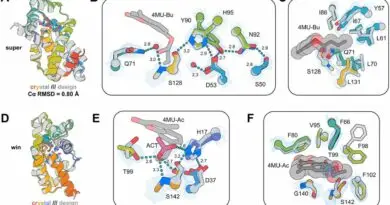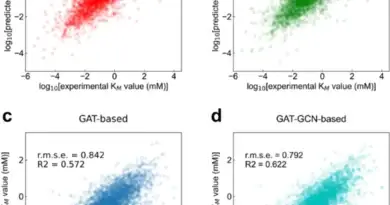Revolutionary Enzyme Research with AlphaFold 2

In a groundbreaking development, AlphaFold 2, an advanced artificial intelligence program developed by DeepMind, is transforming the field of biochemistry. This AI has the remarkable ability to predict the structures of proteins with unprecedented accuracy. Proteins, especially enzymes, are complex molecules that play vital roles in all biological processes. Understanding their structures has been a longstanding challenge for scientists.
Before AlphaFold 2, determining a protein’s structure required time-consuming and labor-intensive techniques like X-ray crystallography. Now, AlphaFold 2 can predict protein shapes, including those of enzymes, in mere minutes. This rapid and precise prediction mirrors actual physical observations, saving researchers months or even years of work.
Imagine enzymes as specialized keys designed to fit specific locks. Without the correct shape, the key cannot function properly. AlphaFold 2 effectively predicts the exact shape of these molecular keys, a task that was previously a significant hurdle in biochemistry.
By unlocking the structures of thousands of enzymes, researchers can now better understand how these proteins work. This knowledge opens the door to modifying or mimicking enzymes in the lab, paving the way for revolutionary treatments and eco-friendly solutions.
Changing the Game: How AlphaFold 2 Solves the Enzyme Puzzle
The magic of enzymes lies in their three-dimensional structures—a complex folding of amino acid chains that enables their catalytic activity. Understanding these structures at the molecular level has been a challenging puzzle. AlphaFold 2 acts like a master puzzle solver, visualizing the final picture without prior knowledge.
Using a database of known protein structures, the AI learns patterns of amino acid arrangements. It then applies this knowledge to predict the structures of new proteins. By assessing how each part of an amino acid chain folds in space relative to others, AlphaFold 2 tackles an immense computational task, considering the vast number of possible configurations.
For enzymes, this means scientists can rapidly identify the active site—the crucial area where chemical reactions occur. Knowing the shape and characteristics of active sites is essential for designing drugs that can either inhibit or enhance an enzyme’s activity, which is fundamental in treating many diseases.
For instance, in drug discovery, traditional methods resembled designing a lock for an unseen key. With AlphaFold 2, researchers now have a detailed blueprint of the key, allowing them to design a lock—or a drug—that fits perfectly. This accelerates new pharmaceutical development and reduces the time and cost to bring drugs to market.
Beyond medicine, the applications extend to various industries. Enzymes play significant roles in industrial processes, from brewing beer to producing biofuels. With AlphaFold 2’s predictions, bioengineers can create new enzymes or improve existing ones to be more efficient and stable under industrial conditions, leading to more sustainable processes.
From Virtual Predictions to Real-World Applications
AlphaFold 2’s impact is not just theoretical; it is leading to tangible benefits across multiple fields.
Pharmaceutical Advancements
In the pharmaceutical industry, understanding how disease-causing enzymes operate allows for faster drug development. For diseases like Alzheimer’s, where enzymes contribute to the buildup of brain plaques, or certain cancers that rely on enzymes for growth, AlphaFold 2 provides a map for designing molecules that can intervene precisely.
Agricultural Improvements
The agriculture sector also stands to benefit. Enzymes are central to plant health and soil fertility. With better insights into their structures, scientists can develop crops that are more resistant to pests and diseases or have higher yields. This advancement is crucial for addressing food security as the global population grows.
Environmental Solutions
In environmental science, enzymes can be engineered to break down pollutants more efficiently. AlphaFold 2’s insights aid in designing enzymes that could degrade plastic waste or clean up oil spills, contributing to a more sustainable planet.
Educational and Research Opportunities
Educational institutions and research labs benefit from AlphaFold 2’s open-access database. Students and researchers can explore protein structures without expensive lab equipment, democratizing information and inspiring innovation.
Overcoming Challenges and Looking Ahead
While AlphaFold 2 offers immense potential, transitioning from predicted models to real-world applications presents challenges.
- Biological Complexity: Predicted structures may not always align perfectly with enzyme behavior in living organisms.
- Functional Understanding: Knowing a structure doesn’t automatically reveal how an enzyme functions, as dynamics and interactions with other molecules play significant roles.
Despite these hurdles, the scientific community is optimistic. AlphaFold 2 is a dynamic tool that continues to learn and improve with each new dataset it analyzes.
Broader Implications for Science and Society
The success of AlphaFold 2 heralds a new era in scientific discovery, extending beyond enzyme research.
Advancements in Materials Science
Materials scientists can leverage protein structures to develop new biodegradable materials or enhance existing ones, leading to stronger, more sustainable products.
Insights into Evolutionary Biology
Analyzing protein structures across species can shed light on evolutionary mechanisms and the relationship between form and function in biology.
Ethical Considerations
As with any powerful technology, there are ethical and policy considerations. The ability to model and potentially synthesize enzymes raises concerns about biosecurity. Establishing regulatory frameworks is essential to ensure the technology benefits society responsibly.
Future of Personalized Medicine
AlphaFold 2’s approach could revolutionize personalized medicine. Predicting protein interactions and the effects of mutations may lead to treatments tailored to an individual’s unique biology.
Conclusion
AlphaFold 2 is more than a milestone in protein research; it represents a transformational shift in understanding life’s molecular machinery. By revealing the secrets of enzymes and other proteins, this AI platform sets the stage for innovations that could reshape our world—from treating diseases and enhancing food production to addressing environmental challenges.
As we piece together the puzzle of life, one protein at a time, AlphaFold 2 is helping to accelerate scientific discovery and improve the human condition.
References
Keywords
AlphaFold 2, Enzyme Research, Protein Structures, Artificial Intelligence, DeepMind, Biochemistry, Drug Discovery, Biotechnology, Sustainable Solutions
Disclaimer: The information presented in this article is for educational purposes and reflects findings from current research. For detailed information, please consult the original research papers or a qualified professional.



